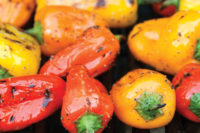Brussels Sprouts, Cabbage May Help Kill Cancer Cells
November 1/Leicester, U.K./Right Vision News -- Eating brussels sprouts and cabbage could help kill cancer cells when combined with traditional chemotherapy, according to new research by British scientists.
A study conducted by University of Leicester researchers and recently presented at the National Cancer Research Conference in Britain found that a naturally occurring compound in green leafy vegetables such as brussels sprouts and cabbage -- indole-3-carbinol (I3C) -- could be a powerful cancer fighter when used in combination with chemotherapy drugs.
I3C -- which can be found in cruciferous vegetables that belong to the mustard family, including cauliflower and broccoli -- were found to make breast cancer tumors more vulnerable to chemotherapy drugs.
The researchers fed breast cancer cells 300 to 400 mg of I3C -- which equals roughly a shopping cart full of cabbages -- and found that after supplementation, the cells were then more easily killed when exposed to chemotherapy drugs.
Margaret Manson, the study's lead author, told the conference that although the trials were still in the early stages, she hoped one day the I3C treatments could be used to help improve conventional cancer treatments. Manson said supplementing with I3C could eventually result in breast cancer patients being effectively treated with lower doses of chemotherapy drugs. I3C could similarly affect colon cancer cells, the researchers said.
Holistic nutritionist Mike Adams, author of "The Seven Laws of Nutrition," says simple foods frequently offer the most powerful anti-cancer medicine in the world.
"Breast cancer is easily prevented with the help of the right foods: cruciferous vegetables, garlic and onions, ginger, raw almonds and herbs like green tea, licorice or rosemary," said Adams, creator of HealingFoodReference.com, a free online database that allows users to search for natural foods that can help treat specific health conditions.
"Women can also help prevent breast cancer by avoiding all the foods that promote it: processed meat products, dairy products from hormone-injected cows, fried foods and anything with hydrogenated oils," Adams said.
From the November 15, 2010, Prepared Foods E-dition
Looking for a reprint of this article?
From high-res PDFs to custom plaques, order your copy today!



